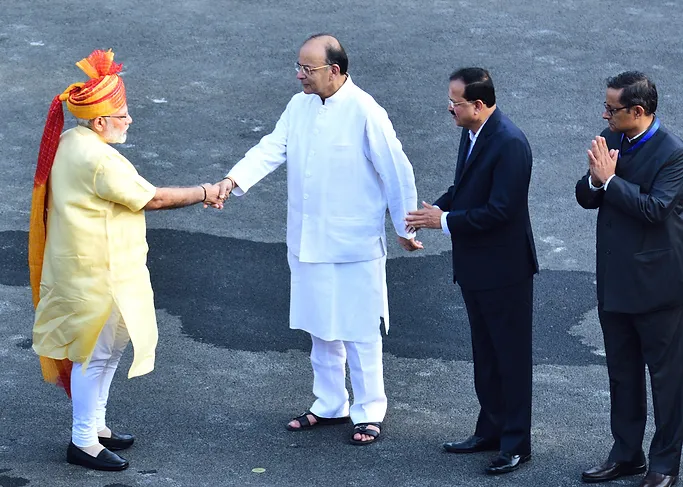Rajan's exit and the UK referendum won't dampen the risk appetite for the India story.
At the macro level, Brexit is a non-event from an Indian perspective. To be sure, there are many companies (we own some in the portfolio) with significant exposure to the UK as an export market or a manufacturing or service base. In fact, Brexit has helped everyone forget about the embarrassing methodology used to shunt out Raghuram Rajan, Governor of the Reserve Bank of India, from his job by September 4th, 2016 rather than allow him the customary 2-year extension. The news of Rajan's decision to return to academia broke on June 18th and the Brexit results were announced on June 24th.
The only thing that can take the shine out of India's role as a bright star in the dull global economy is the legendary ability of India to shoot itself in the foot. At a recent conference (before announcing his desire to return to academia and not seek the extension as the Governor of the Reserve Bank of India, Governor Rajan gave the following joke (paraphrased):
A delegation from India went to visit South Korea and said they were there to study how Korea - which was poorer than India in the 1950's - had become such a wealthy economy. The Korean leader pointed to some books on the wall and said, “The answer is in those books.”
Excitedly, the Indian delegates ran to the bookshelf and pulled out the books and began reading them. Within a minute the Indian delegates in unison said, “But these are the Five Year Plans written by us for India!”
To which the Korean leader blandly replied, “Yes, but we implemented them!”
India's legendary brain power has been wasted by the political compulsions and machinations of an elite business class many of whom preferred to steal a fortune rather than build one. The exit of Rajan is seen by many as a victory for the crony capitalists who had much to lose from RBI's forceful cleansing of the banking system and publicly announcing the names of the defaulting business groups. Looked up to by servile journalists (who work in media owned by many of the industrial business houses), a public release of a shame list would hurt the well-nurtured image of social welfare and largesse that these groups have built up with photo-ops of daughters and wives cutting ribbons at various poster social events. When you steal a 100, giving away 2 (via a Corporate Social Responsibility law) is a pretty good bargain for redemption.
Prime Minister Modi is at a crossroad in his political career. Over the past 24 months in power he has been mostly silent while elements in the BJP have trodden what is called a 'nationalist' path. India - by many accounts - is far more tolerant than many nations but there is a threat that this may change. It has taken Turkey all of 3 years to head towards the Dark Ages. The Book of Being a Good Indian, seemingly being scripted by the BJP, has touched upon topics like what the education books should or should not say; to discussion on languages that must be learnt; to what food is cooked in the kitchen; to what is acceptable behavior from women and what is deemed immoral.
Like Mao's Red Book - or those of any fundamentalist believer in any religion - such guides detract from solving India's very solvable problems and grabbing the opportunities that exist for India to be in the same per capita economic league as South Korea. Dusty Five Year Plans may be better manuals for India to follow.
Prime Minister Modi also has to worry about his own political future and that of his party, the BJP. With state elections looming over the next 2 years (UP, the largest state, will have its state elections by May 2017 - see Table 3) Modi needs money. Having been tough on the crony capitalists, it is a moot point on how the BJP plans to fund the coming elections. It is possible that the industrial families first ask Modi to “show me the money” before they open their purse strings. After having eradicated over three decades of rampant cronyism under successive regimes of mostly Congress-led governments, Modi has delivered an epic victory for India in a short span of 2 years. Will this now be surrendered for the greater good of staying in power to work more for the people? We all know how these “compromise just once” stories end.
India moved to an 'overweight'
With the macro noise around us, we remain bottom-up stock pickers. As managers with the mandate to look after your capital, we remain disciplined to our value process. Our challenges are: to understand and analyze businesses; to decipher the valuations ascribed to these businesses in the stock market; and to assess the ability of the managements to guide these businesses in uncertain times and to share the returns fairly with minorities.
So, go ahead and make the “risky” decision to invest in the volatile stock markets of India, knowing that it is our job - as disciplined, long term, value investors - to assess the risks of managements and valuations. To reduce your risks so that you can get your fair share of profits as the growth of the Indian economy generates significant potential investment returns over the next decade.
As we continue to deploy capital, we had suggested a minor step-up in the allocation to India in August 2015 - since long term valuations support it. There is no significant surge in the long term earnings potential of companies in India from this budget. However, the sudden drop in share prices, suggests we are now at a point of “full allocation”. A combination of a price correction and the passage of time against a backdrop of a 6.5% real rate of growth in GDP (old date series) make the Indian stock market a “value” investment.
We believe that, at these valuations, India deserves about “125% to 150%” of your long term allocation - a step up from the “75% to 100%” range of August 2015. As markets continue correcting and the optimism of an India Shining story fades, we may be ready to move to a pound-the-table load-it-up overweight. Valuations in the Indian historical context and the expectations of growth in earnings within India, drive our “underweight”, “neutral”, or “overweight” views. Flows and “relative” choices in the world do not drive our “allocation calls”.
















